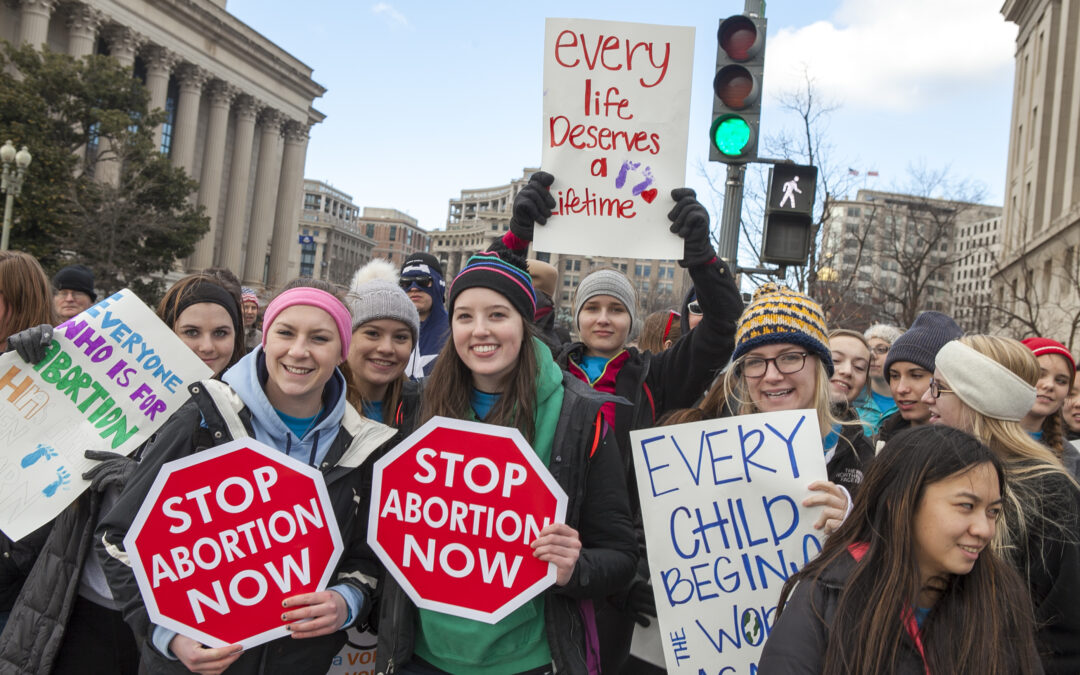Poland, Saudi Arabia and 29 other countries have joined the United States in signing a declaration on women’s health that denies the right to abortion, promotes “the family as foundational to society”, and emphasises “each nation’s sovereign right” to implement its own policies in these areas.
The document – officially titled the Geneva Consensus Declaration on Promoting Women’s Health and Strengthening the Family – is seen as a rebuke to United Nations human rights bodies that have sought to protect access to abortion, notes the Washington Post.
Among the signatories, the only two countries from the European Union are Poland and Hungary. They are ranked as the bloc’s worst two places for access to contraception in the annual Contraception Atlas created by the European Parliamentary Forum for Sexual and Reproductive Rights.
The launch of the Geneva Consensus came just as abortion was yesterday almost completely banned in Poland by the country’s top constitutional court, sparking protests from women’s rights groups.
The new declaration’s core supporters, alongside the US and Hungary, are Brazil, Egypt, Indonesia and Uganda. Other signatories include Belarus, Saudi Arabia, Bahrain, the United Arab Emirates, Iraq, Sudan, South Sudan and Libya.
Many of the countries rank among the bottom twenty in the Women, Peace and Security Index published by Georgetown University, notes The Guardian, while none of them are among the index’s top twenty.
The document was signed during a “virtual gathering” organised by US Secretary of State Mike Pompeo and Secretary of Health and Human Services Alex Azar. It aims to “defend the unborn and reiterates the vital importance of the family,” said Pompeo.
Live Now! @SecPompeo participates in a signing ceremony of the Geneva Consensus Declaration with @HHSgov @SecAzar. https://t.co/G7SaBK4Aod
— Department of State (@StateDept) October 22, 2020
Although it has no binding legal force, the declaration is seen as an attempt by states that champion conservative values to influence international discussion on human rights.
The document begins by affirming that the “human rights of women are an inalienable, integral, and indivisible part of all human rights” and that “women and girls must enjoy equal access to quality education, economic resources, and political participation”.
However, it also states that “there is no international right to abortion nor any international obligation on the part of states to finance or facilitate abortion”. The signatories emphasise that “in no case should abortion be promoted as a method of family planning”.
They say that decisions “related to abortion within the health system can only be determined at the national or local level”, and that “each nation has the sovereign right to implement programs and activities consistent with their laws and policies”.
The countries also pledge to “support the role of the family as foundational to society” and “express the essential priority of protecting the right to life”.
FM @RauZbigniew confirmed 🇵🇱 support for the Geneva Consensus Declaration signed today by 30+ countries.
The declaration aims to reaffirm commitment to protect human life, strengthen family as the foundational unit of society and to achieve better health for women. pic.twitter.com/vQeThH3XNc
— Ministry of Foreign Affairs 🇵🇱 (@PolandMFA) October 22, 2020
Announcing Poland’s participation in the declaration, foreign minister Zbigniew Rau explained that Poland supports the “important initiative” because it believes “that family is of fundamental importance to any strong society” and that “every woman deserves to lead a healthy life”.
Poland’s national-conservative Law and Justice (PiS) government has placed great emphasis on family policy, including its flagship child-benefit programme. A number of local authorities in Poland have also signed a “Charter of Family Rights” that rejects same-sex marriage and calls for the “protection of children from moral corruption”.
Earlier this year, the justice minister, Zbigniew Ziobro, began the process of withdrawing Poland from a European convention on combating violence against women. He argued that the treaty “promotes LGBT” and that Poland can protect women without being a signatory.
In response to the Geneva Consensus, Amnesty International has condemned the declaration as a “giant step backwards” that “tramples on every person’s right to choose”.
“Every person has a right to their individual personal and bodily autonomy,” including the right to abortion, said Tarah Demant, Amnesty’s director of gender, sexuality and identity.
“The United States…joins a list of countries willingly endangering people’s health and lives,” she added. “This administration doesn’t seem content to stop until it has fully trampled on the rights, autonomy, and dignity of women and girls everywhere.”
The anti-abortion Geneva Consensus Declaration, signed yesterday by the U.S. and others, is another giant step backwards for reproductive rights globally. pic.twitter.com/nsHnTu62wx
— Amnesty International (@amnesty) October 23, 2020
Some groups have also expressed concern that the document, with its emphasis on the family as “the natural and fundamental group unit of society”, will reinforce the anti-LGBT rhetoric and policies pursued by many of the signatories, including Poland.
“This will undoubtedly bring harm to LGBTQ people and roll back the established global consensus about the necessity of protecting the sexual and reproductive health and rights of women and girls in all their diversity,” David Stacy, government affairs director of the Human Rights Campaign, told the Washington Post.
On the same day as Rau announced Poland’s support for the declaration, the country’s Constitutional Tribunal – an institution seen as being under the influence of PiS – issued a ruling that in effect introduces a near total ban on abortion.
It found that abortions in cases where the foetus has birth defects – which make up around 98% of all legal terminations in Poland – are unconstitutional.
The ruling immediately set off protests around Poland, including a march through Warsaw as thousands made their way from outside the tribunal towards PiS headquarters. Many carried banners with slogans such as “you have blood on your robes” and “the law should defend us”, reports Polityka.
Later that evening, a large group of protesters gathered outside the home of Jarosław Kaczyński, PiS’s chairman and Poland’s de facto leader. Some of the demonstrators clashed with police, who repeatedly used tear gas against the crowds. Police said objects including stones had been thrown at them.
Further clashes outside Jarosław Kaczyński's house between protesters and police, who continue to use tear gas (via @marcinterlik) pic.twitter.com/SOyAgpec4T
— Notes from Poland 🇵🇱 (@notesfrompoland) October 22, 2020
Kaczyński has, like other leading PiS figures, expressed support for ending what they call “eugenic abortions”, meaning those justified by birth defects detected in the foetus.
“We will strive to ensure that even very difficult pregnancies, when the child is condemned to death, is severely deformed, will end in birth, so that the child can be christened, buried, given a name,” said Kaczyński in 2016.
The leaders of last night’s protests have announced that they will restart at 7 p.m. tonight in the Żoliborz district of Warsaw where Kaczyński’s house is located.
Under current coronavirus restrictions, organised gatherings are supposed to be limited to 10 people. From tomorrow, a new limit restricting gatherings to no more than five people not from the same household goes into force.
The president welcomes yesterday's ruling that abortions due to birth defects – which constitute almost all legal terminations in Poland – are unconstitutional
"Abortion for eugenic reasons should not be allowed. I believe every child has a right to life" https://t.co/RJvRExOcsc
— Notes from Poland 🇵🇱 (@notesfrompoland) October 23, 2020
Main image credit: American Life League/Flickr (under CC BY-NC 2.0)

Maria Wilczek is deputy editor of Notes from Poland. She is a regular writer for The Times, The Economist and Al Jazeera English, and has also featured in Foreign Policy, Politico Europe, The Spectator and Gazeta Wyborcza.




















